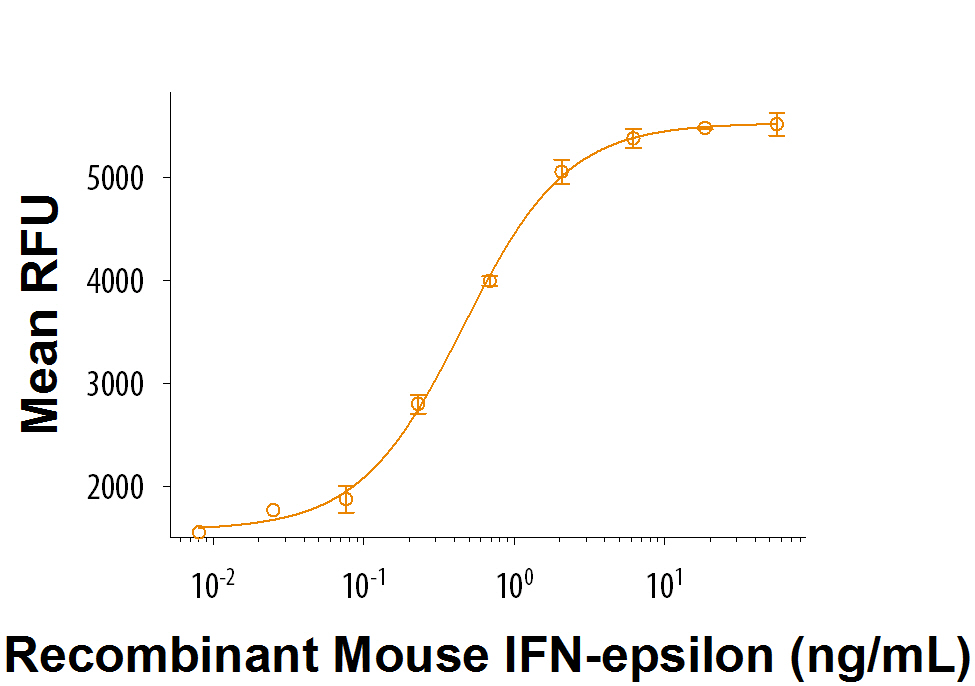Recombinant Mouse IFN-epsilon Protein Summary
Product Specifications
Leu22-Pro192, with N-terminal Met and C-terminal 6-His tag
Analysis
Product Datasheets
Carrier Free
CF stands for Carrier Free (CF). We typically add Bovine Serum Albumin (BSA) as a carrier protein to our recombinant proteins. Adding a carrier protein enhances protein stability, increases shelf-life, and allows the recombinant protein to be stored at a more dilute concentration. The carrier free version does not contain BSA.
In general, we advise purchasing the recombinant protein with BSA for use in cell or tissue culture, or as an ELISA standard. In contrast, the carrier free protein is recommended for applications, in which the presence of BSA could interfere.
9147-ME
| Formulation | Lyophilized from a 0.2 μm filtered solution in Citric Acid and CHAPS with BSA as a carrier protein. |
| Reconstitution | Reconstitute at 100 μg/mL in water. |
| Shipping | The product is shipped at ambient temperature. Upon receipt, store it immediately at the temperature recommended below. |
| Stability & Storage: | Use a manual defrost freezer and avoid repeated freeze-thaw cycles.
|
9147-ME/CF
| Formulation | Lyophilized from a 0.2 μm filtered solution in Citric Acid and CHAPS |
| Reconstitution | Reconstitute at 100 μg/mL in water. |
| Shipping | The product is shipped at ambient temperature. Upon receipt, store it immediately at the temperature recommended below. |
| Stability & Storage: | Use a manual defrost freezer and avoid repeated freeze-thaw cycles.
|
Scientific Data
 View Larger
View Larger
Recombinant Mouse IFN-epsilon (Catalog # 9147-ME) demonstrates anti-viral activity in L‑929 mouse fibroblast cells infected with encephalomyocarditis (EMC) virus. The ED50 for this effect is 0.2-1 ng/mL.
Reconstitution Calculator
Background: IFN-epsilon
Interferon-epsilon (IFN-epsilon ) is a secreted, approximately 18 kDa member of the type I interferon family of molecules (1). Mature mouse IFN-epsilon shares 55% amino acid sequence identity with human and rat IFN-epsilon, respectively. IFN-epsilon signals through IFN-alpha / beta R1 and IFN-alpha / beta R2 and contributes to TNF-alpha induced signaling (2, 3). It is constitutively expressed in epithelial cells lining the lung, intestines, testes, and female reproductive tract, and it is further up-regulated in the uterus by estrogen
(2-6). IFN-epsilon provides mucosal barrier protection against the pathogens Chlamidia and Herpes simplex virus 2 (2). It induces B cell activation and the attraction of CD8+ T cells to sites of virus infection (5, 7).
- Wijesundara, D.K. et al. (2014) Front. Immunol. 5:412.
- Fung, K.Y. et al. (2013) Science 339:1088.
- Matsumiya, T. et al. (2007) J. Immunol. 179:4542.
- Demers, A. et al. (2014) J. Leukoc. Biol. 96:1101.
- Xi, Y. et al. (2012) Mucosal Immunol. 5:610.
- Hermant, P. et al. (2013) PLoS One 8:e71320.
- Day, S.L. et al. (2008) J. Immunol. 180:7158.
FAQs
No product specific FAQs exist for this product, however you may
View all Proteins and Enzyme FAQsReviews for Recombinant Mouse IFN-epsilon Protein
Average Rating: 4 (Based on 1 Review)
Have you used Recombinant Mouse IFN-epsilon Protein?
Submit a review and receive an Amazon gift card.
$25/€18/£15/$25CAN/¥75 Yuan/¥2500 Yen for a review with an image
$10/€7/£6/$10 CAD/¥70 Yuan/¥1110 Yen for a review without an image
Filter by:
Reason for Rating: we don't plan to publish data yet
